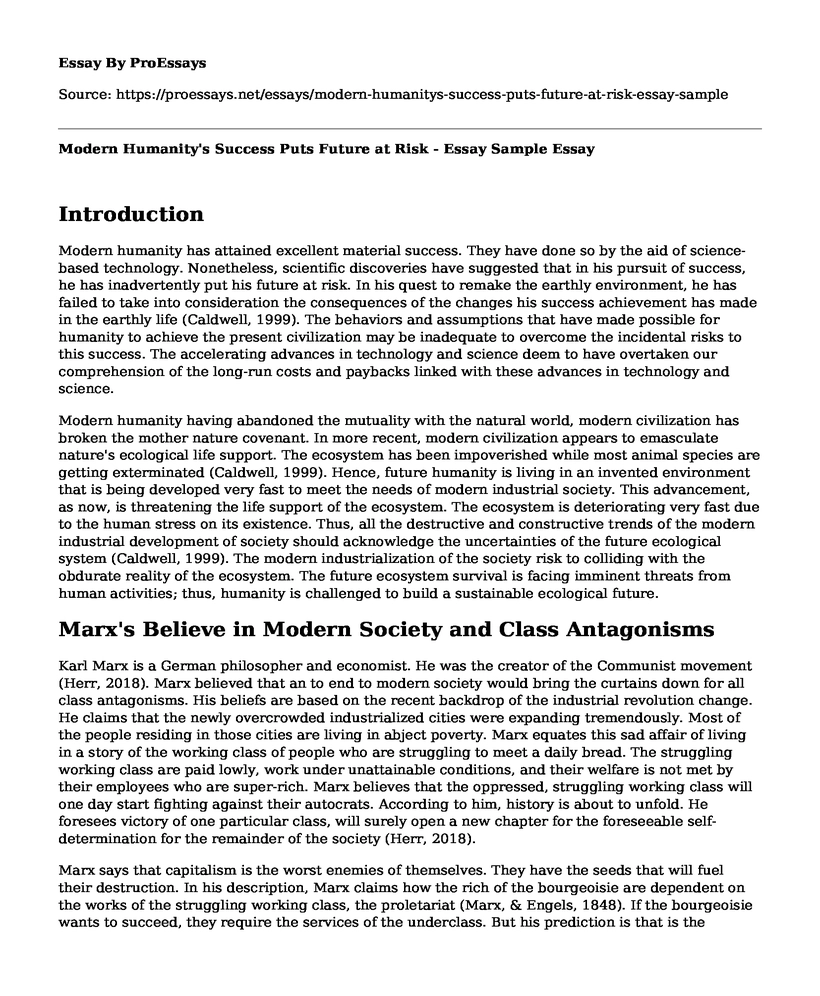Introduction
Modern humanity has attained excellent material success. They have done so by the aid of science-based technology. Nonetheless, scientific discoveries have suggested that in his pursuit of success, he has inadvertently put his future at risk. In his quest to remake the earthly environment, he has failed to take into consideration the consequences of the changes his success achievement has made in the earthly life (Caldwell, 1999). The behaviors and assumptions that have made possible for humanity to achieve the present civilization may be inadequate to overcome the incidental risks to this success. The accelerating advances in technology and science deem to have overtaken our comprehension of the long-run costs and paybacks linked with these advances in technology and science.
Modern humanity having abandoned the mutuality with the natural world, modern civilization has broken the mother nature covenant. In more recent, modern civilization appears to emasculate nature's ecological life support. The ecosystem has been impoverished while most animal species are getting exterminated (Caldwell, 1999). Hence, future humanity is living in an invented environment that is being developed very fast to meet the needs of modern industrial society. This advancement, as now, is threatening the life support of the ecosystem. The ecosystem is deteriorating very fast due to the human stress on its existence. Thus, all the destructive and constructive trends of the modern industrial development of society should acknowledge the uncertainties of the future ecological system (Caldwell, 1999). The modern industrialization of the society risk to colliding with the obdurate reality of the ecosystem. The future ecosystem survival is facing imminent threats from human activities; thus, humanity is challenged to build a sustainable ecological future.
Marx's Believe in Modern Society and Class Antagonisms
Karl Marx is a German philosopher and economist. He was the creator of the Communist movement (Herr, 2018). Marx believed that an to end to modern society would bring the curtains down for all class antagonisms. His beliefs are based on the recent backdrop of the industrial revolution change. He claims that the newly overcrowded industrialized cities were expanding tremendously. Most of the people residing in those cities are living in abject poverty. Marx equates this sad affair of living in a story of the working class of people who are struggling to meet a daily bread. The struggling working class are paid lowly, work under unattainable conditions, and their welfare is not met by their employees who are super-rich. Marx believes that the oppressed, struggling working class will one day start fighting against their autocrats. According to him, history is about to unfold. He foresees victory of one particular class, will surely open a new chapter for the foreseeable self-determination for the remainder of the society (Herr, 2018).
Marx says that capitalism is the worst enemies of themselves. They have the seeds that will fuel their destruction. In his description, Marx claims how the rich of the bourgeoisie are dependent on the works of the struggling working class, the proletariat (Marx, & Engels, 1848). If the bourgeoisie wants to succeed, they require the services of the underclass. But his prediction is that is the bourgeoisie continue to undermine the underclass; eventually, a great resentment will be created by the underclass. In the long run, the proletariat will formulate a revolution against the exploitations of the bourgeoisie. The revolution will finally lead to the upheaval of capitalism. Following the defeat of capitalism, Marx believes a new classless society will surface based fresh new ideas (Marx, & Engels, 1848). In that classless society, wealth, labor, land and industry will be equitably shared amongst all people, hence ushering the disappearance of the class of antagonisms.
Reference
Caldwell, L. K. (1999). Is humanity destined to self-destruct?. Politics and the Life Sciences, 18(1), 3-14. https://www.cambridge.org/core/journals/politics-and-the-life-sciences/article/is-humanity-destined-to-selfdestruct/CED132B5E57952A91E4B581C551EBFAE
Herr, H. (2018). The Communist Manifesto: What can we learn today for a country like Vietnam? (No. 98/2018). Working Paper, Institute for International Political Economy Berlin. https://www.econstor.eu/bitstream/10419/175324/1/1013867963.pdf
Marx, K., & Engels, F. (1848). The Communist Manifesto. Selected Works by Karl Marx and Frederick Engels. New York: International Publishers, 1363.
Cite this page
Modern Humanity's Success Puts Future at Risk - Essay Sample. (2023, Mar 12). Retrieved from https://proessays.net/essays/modern-humanitys-success-puts-future-at-risk-essay-sample
If you are the original author of this essay and no longer wish to have it published on the ProEssays website, please click below to request its removal:
- Essay Sample on Strategy and Business Innovation Model
- Why High Schools Should Look To Implement A Smartphone Ban? - Essay Sample
- The Debate Of AI & Robotics Vs Human Labor: Pros & Cons
- Paper Example: Hard-Working Innovator With Detail-Oriented Skills for Experiential Education
- Green Energy & Lubricant Industry: Impact & Supply Chain at Shell - Research Paper
- China's Tech Innovation: Race to the Top of the Digital Space - Research Proposal
- Maximizing Potential: The iPhone SE in the Modern Era - Essay Sample







